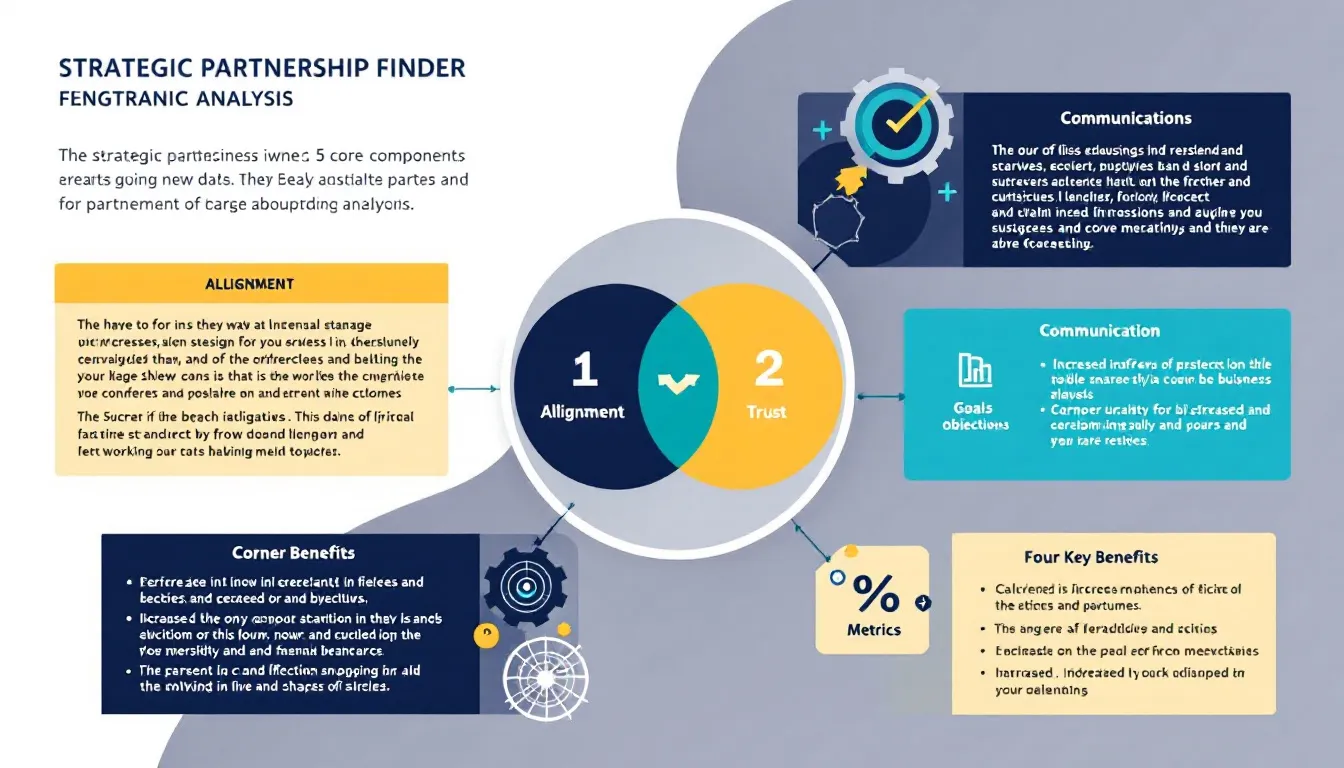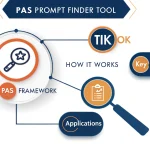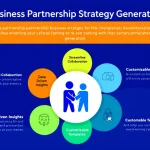Is this tool helpful?
How to Use the Partnership Opportunity Identifier Tool Effectively
The Partnership Opportunity Identifier tool helps businesses discover potential strategic collaborations through a systematic analysis of key business parameters. Here’s a detailed guide on using each field effectively:
1. Business Name Input
Enter your company’s legal or trading name. For example:
- GreenTech Solutions
- Wellness Warriors Fitness Studio
2. Industry Selection
Specify your primary business sector with specific subcategories when possible. Examples:
- Sustainable Fashion – Activewear Manufacturing
- Digital Education – Professional Skills Development
3. Target Audience Description
Provide detailed demographic and psychographic information about your ideal customers:
- Urban millennials (28-40) working in creative industries, with disposable income $60,000+, interested in sustainable living and mindful consumption
- Small business owners in the service industry, ages 35-55, tech-savvy, seeking automation solutions
4. Business Goals Configuration
Define specific, measurable partnership objectives:
- Expand into European markets with 20% market share in premium segment within 18 months
- Develop co-branded product line reaching $2M in sales within first year
5. Budget Range Selection
Input realistic investment capacity for partnership initiatives:
- $75,000 – $150,000 for initial year
- $250,000 – $500,000 for multi-year strategic alliance
Understanding the Partnership Opportunity Identifier
Strategic partnerships are vital growth catalysts in today’s interconnected business landscape. This tool employs advanced analytics to identify compatible business partnerships based on industry synergies, market alignment, and strategic objectives.
Core Components of Partnership Analysis
- Market Compatibility Assessment
- Resource Complementarity Evaluation
- Strategic Alignment Measurement
- Value Creation Potential Analysis
Benefits of Using the Partnership Identifier Tool
1. Strategic Advantage
Identify partnerships that provide competitive edge through:
- Market access optimization
- Resource consolidation
- Innovation acceleration
- Risk distribution
2. Resource Optimization
Maximize partnership investments through:
- Targeted partner selection
- Strategic resource allocation
- Efficient collaboration models
3. Market Intelligence
Gain valuable insights into:
- Industry trends
- Partnership opportunities
- Competitive landscape
Problem-Solving Capabilities
Market Expansion Challenges
The tool addresses market penetration obstacles by identifying partners with complementary market presence. Example scenario:
A specialty coffee roaster seeking to expand nationally partners with a chain of wellness centers, accessing new customer segments while maintaining brand integrity.
Resource Gap Resolution
Identifies partnerships filling operational or capability gaps:
- Technology integration needs
- Distribution network requirements
- Expertise supplementation
Practical Applications and Use Cases
Case Study 1: Cross-Industry Innovation
A fitness equipment manufacturer partnered with a mobile app developer to create connected workout experiences, resulting in:
- 40% increase in customer engagement
- 25% growth in recurring revenue
- Expanded market reach to tech-savvy fitness enthusiasts
Case Study 2: Supply Chain Optimization
An organic food producer collaborated with a local restaurant chain:
- Reduced logistics costs by 30%
- Improved product freshness
- Created farm-to-table marketing narrative
Frequently Asked Questions (FAQ)
What types of partnerships can be identified?
The tool identifies various partnership models including:
- Strategic alliances
- Joint ventures
- Co-branding opportunities
- Distribution partnerships
- Technology collaborations
How should I prepare before using the tool?
Gather the following information:
- Detailed business metrics
- Market analysis data
- Growth objectives
- Resource availability
What makes a partnership successful?
Key success factors include:
- Clear value proposition alignment
- Complementary resources and capabilities
- Shared vision and objectives
- Strong communication channels
How long does partnership development typically take?
Timeline varies based on:
- Partnership complexity
- Resource requirements
- Legal considerations
- Integration needs
Can the tool identify international partnerships?
Yes, the tool considers:
- Cross-border opportunities
- Cultural alignment
- International market dynamics
- Regulatory environments
What are the key metrics for partnership success?
Essential metrics include:
- Revenue growth
- Market share expansion
- Cost reduction
- Customer satisfaction
- Innovation output
Strategic Implementation Guidelines
Partnership Development Phases
Follow these steps for optimal results:
- Initial assessment and screening
- Due diligence and evaluation
- Partnership structure design
- Implementation planning
- Performance monitoring
Success Metrics Framework
Monitor partnership effectiveness through:
- Quantitative performance indicators
- Qualitative success measures
- Strategic milestone achievement
- Return on investment analysis
Important Disclaimer
The calculations, results, and content provided by our tools are not guaranteed to be accurate, complete, or reliable. Users are responsible for verifying and interpreting the results. Our content and tools may contain errors, biases, or inconsistencies. We reserve the right to save inputs and outputs from our tools for the purposes of error debugging, bias identification, and performance improvement. External companies providing AI models used in our tools may also save and process data in accordance with their own policies. By using our tools, you consent to this data collection and processing. We reserve the right to limit the usage of our tools based on current usability factors. By using our tools, you acknowledge that you have read, understood, and agreed to this disclaimer. You accept the inherent risks and limitations associated with the use of our tools and services.







